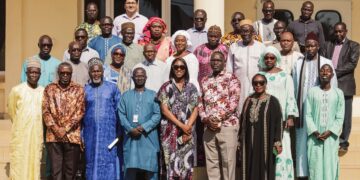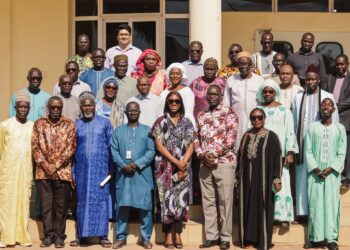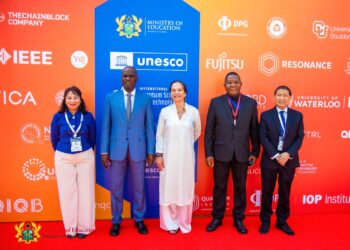The Rwanda Education Board (REB) is stepping up efforts to improve the quality of education through the integration of Information and Communication Technology (ICT), according to its Director General, Nelson Mbarushimana.
As part of this initiative, 18,500 laptops, along with projectors and projector screens, are being distributed to 101 selected schools across eight districts. Each school is receiving 55 laptops to be used in smart classrooms designed to create an interactive, digital learning environment. The move aims to help students access online textbooks, conduct research, and build essential ICT skills while supporting teachers through optional English language training and ICT upskilling.
In order to proceed with enhancing the quality of education through the integration of ICT , the Ministry of Education through Rwanda Basic Education Board is distributing 18,500 laptops with projectors and projector screens to 101 selected schools across 8 districts. @mbanelson pic.twitter.com/Gn6pgtKoXQ– Rwanda Basic Education Board (@REBRwanda) May 28, 2025
More equipment is expected to be distributed in September to ensure all schools in the country benefit from modern educational technology.
ALSO READ: REB introduces remedial courses for over 300,000 lower primary pupils
According to Mbarushimana, the goal is not just to put laptops in classrooms but to transform how students learn and how teachers teach. Each selected school receives 55 laptops, one projector, and one screen in designated smart classrooms. These spaces are meant to make lessons more interactive and practical.
“This is one of our ways to enhance quality education through the integration of ICT. A teacher can give an ICT lesson, and now students will be able to follow and immediately apply what’s being taught,” he explained.
Beyond structured lessons, the programme also considers students in boarding schools. Mbarushimana noted that a weekend timetable will allow them to use the computers for self-guided research and exploration.
“If students want to do research during their free time, they can go to the smart classroom and learn different things. This will help them study well and understand ICT better,” he said.
ALSO READ: Over 500 primary schools adopt digital approach to improve learning
Teachers aren’t being left behind in the digital push. REB plans to roll out optional English language training with Education Force (EF), a programme designed to improve both communication and teaching capabilities.
“It’s for teachers who are interested, but they can also use the laptops in the smart classrooms to practice or train themselves,” he added, emphasising that all this is part of a broader shift toward digitizing education in Rwanda.
“All our books are online. With the laptops, a student can just open any book–math, chemistry, physics, ICT–and start reading from the computer,” he said, explaining that students will also benefit from internet access in these classrooms, giving them the ability to use search engines such as Google, which will strengthen independent learning and research skills.
“We’re not stopping here. More schools will receive laptops in September, with the same number of devices. Our plan is to make sure every school in the country benefits from ICT.”
Godeliva Mukabagorora, a school administrator at Groupe Scolaire Kagamba in Gicumbi District, said the delivery of the laptops was a long overdue development for the school.
“We are very happy they gave us 55 Lenovo laptops, a projector, and a screen projector. Our students are very excited, and so are the teachers, because this is the first time we’ve received laptops since the school started in 1947. We didn’t have a computer lab, just a few small computers for the children and two bigger ones used by staff,” she said.
While she welcomed the equipment, Mukabagorora emphasized the need for reliable internet access.
“We don’t have internet yet, but we’re using a small 4G modem for now. What we really need is proper internet because that’s what will allow us to use the laptops the way they’re meant to be used,” she added.
Sister Liberata Mukantwari, the director of Groupe Scolaire Rushubi Catholic in Bugesera District, said the smart classroom equipment is a major step forward for students.
“Neither I nor the school had access to this kind of facility, and I believe it will help us achieve more, both for the school and for the country.” She pointed out that before receiving the laptops, students could only learn ICT in theory.
“The challenge was that our students couldn’t practice ICT; it was all theoretical. But now they’ll be able to apply what they learn, and their knowledge will grow. They’ll also be able to do better research,” she said, adding that the school already had internet connectivity, which will enable students and teachers to make full use of the equipment.

















































































 EduTimes Africa, a product of Education Times Africa, is a magazine publication that aims to lend its support to close the yawning gap in Africa's educational development.
EduTimes Africa, a product of Education Times Africa, is a magazine publication that aims to lend its support to close the yawning gap in Africa's educational development.